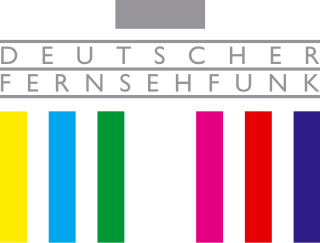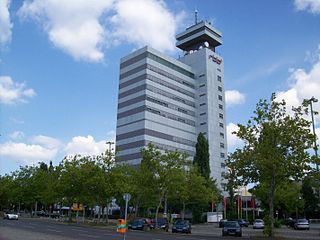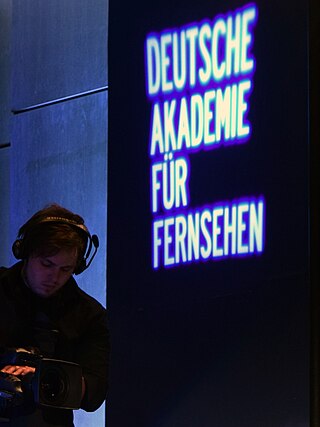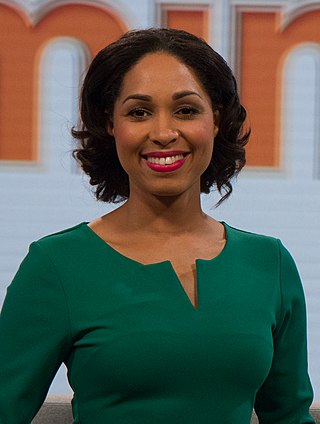Related Research Articles

ZDF, short for Zweites Deutsches Fernsehen, is a German public-service television broadcaster based in Mainz, Rhineland-Palatinate. Launched on 1 April 1963, it is run as an independent nonprofit institution, and was founded by all federal states of Germany. ZDF is financed by television licence fees and advertising revenues.

ARD is a joint organisation of Germany's regional public-service broadcasters. It was founded in 1950 in West Germany to represent the common interests of the new, decentralised, post-war broadcasting services – in particular the introduction of a joint television network.

Juli Zeh is a German writer and judge. She is known for novels such as The Method (2009), Unterleuten (2016) and About People (2021).
Television in Germany began in Berlin on 22 March 1935, broadcasting for 90 minutes three times a week. It was home to the first regular television service in the world, named Fernsehsender Paul Nipkow.

Jänschwalde is a municipality in the district of Spree-Neiße in Brandenburg, Germany. It is situated in the region of Lower Lusatia. The nearest town is Peitz; Cottbus is 25 km away.
Sender Freies Berlin was the ARD public radio and television service for Berlin from 1 June 1954 until 30 April 2003. On 1 January 1992, SFB became the public broadcaster for the whole of reunited Berlin. However, SFB had long had a significant audience in East Berlin for some time before German reunification. On 1 May 2003 it merged with Ostdeutscher Rundfunk Brandenburg to form Rundfunk Berlin-Brandenburg.

Matthias Habich is a German actor who has appeared in more than 110 film and television productions since 1965. Habich was born in Danzig and lives in Paris.

Deutscher Fernsehfunk was the state television broadcaster in the German Democratic Republic from 1952 to 1991.

The Institute for Media and Communication Policy (IfM) was founded in 2005 as an independent research institution that is exclusively dedicated to issues surrounding media and communication policies. It was established in February 2006 in Berlin-Charlottenburg, but in November 2014 it moved to Cologne. The institute is funded by leading German public and private media organizations.

RBB Fernsehen is a German free-to-air television channel owned and operated by Rundfunk Berlin-Brandenburg (RBB) and serving Berlin and Brandenburg. It is one of the seven regional "third programmes" that are offered within the federal ARD network.

Carmen Thomas is a German journalist, radio and television presenter, author and lecturer. On television, she was the first woman to present the ZDF's das aktuelle Sportstudio. She worked for public radio, running Hallo Ü-Wagen, a weekly travelling talk radio show for two decades. In 1990 Forbes named her one of the 100 most influential women in Germany.
The Axel-Springer-Preis is an annually awarded prize. The Award is given to young journalists in the categories print, TV, radio, and online journalism due to the decisions of the Axel-Springer-Akademie.
Clash of Futures is a documentary drama series by Jan Peter and Gunnar Dedio. The series is the continuation of 14 - Diaries of the Great War (2014) and tells the personal stories of thirteen people from all over Europe during the interwar period. The series was part of the eponymous project Clash of Futures. In addition to the series, the project included a theatrical and a radio piece, a book, various Europe-wide special exhibitions and a social media campaign. In the anniversary year of the end of the First World War, the eight-part series first aired September 11, 2018 on Arte.

The Deutsche Akademie, Fernsehen (DAfF) was founded in December 2010 by television professionals from various fields of television production. It has its headquarters in Munich and an office in Cologne.

Jana Pareigis is a German journalist and television moderator. She is the first black woman in German news journalism.

Helmar Rudolf Willi Weitzel is a German television presenter, journalist and film producer. He moderated the television programs Willi wills wissen and Willis VIPs. In 2008 he made the movie Willi und die Wunder dieser Welt. Other TV shows he hosted were Willis Quiz Quark Club, Willi wills wissen – Gute Frage, nächste Frage!, Willi wills wissen von A–Z and Ein guter Grund zu feiern. Since 2013 he has been on the road in Germany with his live program Willis wilde Wege. Since January 2018 he has moderated the magazine Gut zu Wissen on BR Fernsehen.
Die Wannseekonferenz, international title The Conference, is a German TV docudrama, first aired January 24, 2022 by the ZDF broadcaster, about the Wannsee Conference held in Berlin-Wannsee in 1942 to organise the extermination of the Jews.

Unterleuten is a 2016 novel by the German writer Juli Zeh. It is set in a village in Brandenburg and follows the locals, among whom conflicts and ambitions emerge when a company wants to create a wind farm in the area.

The Constitutional Court of Brandenburg is the third constitutional body of the State of Brandenburg, alongside the Landtag of Brandenburg and the Brandenburg State Government. As a constitutional court, it is responsible for deciding constitutional disputes.
References
- ↑ "Unterleuten - Das zerissene Dorf". Filmportal.de . Retrieved 14 May 2024.
- ↑ Krawczyk, Karina (9 March 2020). "ZDF-Miniserie „Unterleuten": kleine Kriege, große Umbrüche". Berliner Morgenpost (in German). Retrieved 14 May 2024.
- ↑ "Die Gewinner der Auszeichnungen 2020" (in German). Deutsche Akademie für Fernsehen. 22 November 2020. Retrieved 14 May 2024.
- ↑ "DAfF-Auszeichnung 2020 – die Nominierten" (in German). Deutsche Akademie für Fernsehen. 28 September 2020. Retrieved 14 May 2024.